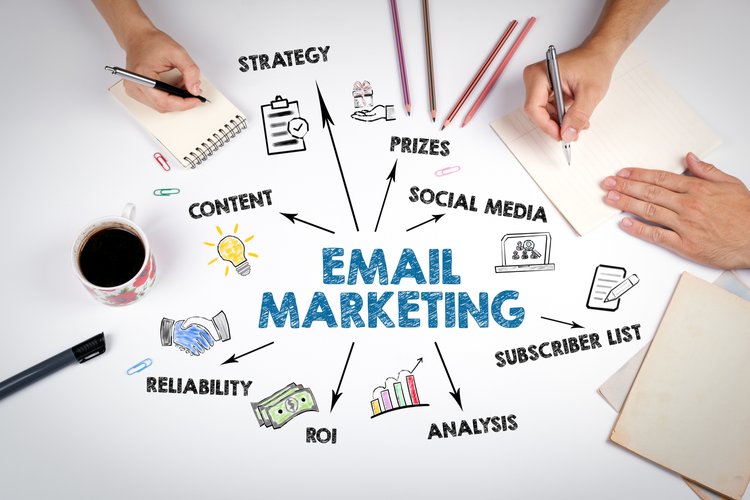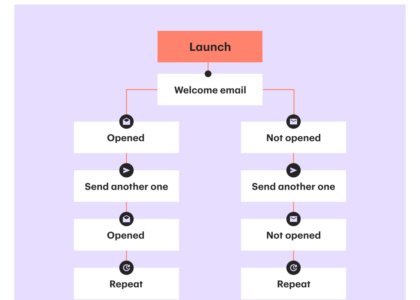Email Marketing Software 101: Choosing the Right One for You
So, you’re ready to get started with Email Marketing…
Good choice!
When it comes to digital marketing, email is still the MVP. A 2023 report from Litmus found that for every $1 spent on email marketing, businesses see an average return of $36. That’s because email lets you connect directly with your audience, keep them engaged, and send personalized messages at scale – all without constantly paying for ads.
Unlike running Facebook or Google ads (where you have to keep spending money to get results), email marketing helps you build long-term relationships without always worrying about ad costs. Plus, your emails actually reach people’s inboxes – no fighting against tricky social media algorithms or expensive ad competition.
Now, to get the most out of your email marketing, you need the right tools. In this guide, we will help you make an informed decision when it comes to choosing the best email marketing software for your needs.
Whether you’re a small startup or a huge company – email marketing works for everyone. Small businesses love it because it’s affordable and helps them connect with customers without breaking the bank. Big brands use email automation to send personalized messages at scale, making it easier to engage customers and boost sales.
Beyond saving money, email builds brand loyalty, encourages repeat purchases, and helps educate customers. If you run an online store, abandoned cart emails remind shoppers to complete their purchases. If you’re in B2B, automated email sequences help nurture leads and close deals.
Think of your email marketing software as the engine driving your email marketing campaigns. The right software ensures your emails get delivered, allows you to set up automations, provides the insights you need to measure success and more. So with that in mind, here’s what you need to consider when choosing the best option for your business.
Define Your Email Marketing Goals
Start by figuring out what you need from your email software. Are you running a simple newsletter, or do you need more complex features like drip campaigns and automations? Most email platforms come with these core features:
- Email Builders: Drag-and-drop design tools, HTML editors, and ready-to-use templates.
- List Management: Contact organization, segmentation, and tagging.
- Automation: Simple autoresponders for welcome emails and confirmations.
- Analytics: Insights into open rates, click-through rates, and subscriber growth.
More advanced platforms include features like:
- Multichannel Integration: Syncing with SMS, social media, and CRM tools for seamless marketing.
- Behavior-Based Automation: Emails triggered by actions like browsing history or past purchases.
- AI-Powered Personalization: Dynamic content that adapts to each subscriber’s interests.
- A/B Testing: Testing different subject lines, content, and send times to maximize engagement.
Also, consider the size of your email list and your budget. For example, if you run a small online store, you’ll want a platform that’s easy to use and integrates with your e-commerce tools for sending out product updates and promotions.
Check Deliverability Rates
Even the best email in the world – witty subject line, eye-catching design, a killer offer – won’t do you any good if it lands in the spam folder. That’s like throwing a party, sending out invites, and then realizing they all got lost in the mail. No one’s showing up.
That’s why deliverability is a big deal. You want an email marketing platform that helps your messages actually reach people’s inboxes, not vanish into the void. Deliverability depends on a few key things, and if you don’t keep an eye on them, your emails might start ghosting your audience. So you want to keep an eye on;
- List Hygiene: If your email list is full of people who never open your emails, old addresses, or spam traps, your sender reputation tanks. Regularly clean your list by removing inactive subscribers – think of it like spring cleaning, but for your marketing.
- Sender Reputation: Email providers (like Gmail, Outlook, etc.) keep tabs on who’s sending emails and how people interact with them. If a platform uses dedicated IPs (instead of sharing them with sketchy senders), your emails are more likely to land where they should.
- Email Authentication: This is like showing your ID at the door. Protocols like SPF, DKIM, and DMARC verify that you’re a legit sender and not some shady bot trying to scam people. If you skip these, your emails are way more likely to get flagged as spam.
The good news? A solid email marketing platform will do a lot of the heavy lifting for you. Look for one that has built-in authentication, blacklist monitoring (so you know if your domain is in trouble), and real-time tracking so you can see if your emails are actually making it through.
Because at the end of the day, high deliverability isn’t just about dodging the spam folder – it’s about making sure your audience sees your emails, engages with them, and (hopefully) takes action. Otherwise, you’re just shouting into the void, and let’s be real, that’s no fun for anyone.
Look for Ease of Use
The best email marketing platforms should be easy to navigate, even if you’re new to the game. If you’re not a designer or coder, go for an email platform with an easy drag-and-drop builder. On the other hand, companies with dedicated marketing teams may require HTML customization for greater design flexibility and brand consistency.
Either way, what you want is a software with an intuitive interface that simplifies the process of building and sending campaigns. A drag-and-drop editor and pre-designed templates make it easy to create beautiful emails without needing design skills. Bonus points for platforms that offer customer support and tutorials helping users get ahead of the learning curve easily.
They MUST HAVE Automation and Personalization
Listen, sending out emails one by one is basically the marketing equivalent of handwriting letters in the age of AI – it’s time-consuming, outdated, and, honestly, who has the patience? That’s where automation and personalization come in, and trust me, they’re total game-changers.
Here at Abervin Digital, we’re big fans of platforms like ActiveCampaign because they don’t just let you send emails – they help you send the right emails to the right people at the right time. And that’s the secret sauce to boosting engagement and, ultimately, making more sales.
With automation, you can create workflows that trigger emails based on customer actions. Someone signed up for your newsletter? Boom – instant welcome email. Abandoned their cart? Here comes a friendly nudge. Browsed your site for a specific product? Time to hit ‘em with a well-timed discount.
And this isn’t just about saving time (though, let’s be real, that’s a huge perk). It’s about making sure you’re consistently reaching your audience with relevant content without manually hitting send every five minutes.
A good email marketing platform lets you segment your audience based on behavior, preferences, or even past purchases. So instead of blasting the same cringey “Dear Valued Customer” message to everyone, you can tailor emails to specific groups and use their actual names.
If someone just bought running shoes from your site, you can follow up with recommendations for the best workout gear.
Let’s say you’re running an online course business. Someone just finished Module 1? Instead of hoping they stick around, you can automate a friendly nudge saying, “Hey, you crushed the first module! Ready to level up with Module 2?” You could even throw in a bonus tip or a discount for the next course to keep them hooked.
And the best part? With the right automation and personalization tools, all of this happens while you sleep. Or sip coffee. Or binge-watch Netflix. Whatever works.
So, when choosing an email marketing platform, don’t just look at the price – check if it has the automation and personalization features that’ll make your life easier and your emails more effective. Because at the end of the day, nobody wants to read boring, irrelevant emails. And you don’t want to waste time sending them.
Scalability: Will Your Chosen Platform Grow with Your Business?
Your email marketing tool should grow with you, not hold you back. When you’re just starting out, it’s easy to go for a platform that’s simple, cheap, and gets the job done. But fast forward a year or two – your email list is bigger, you’re running more complex campaigns, and suddenly, that once-perfect platform starts feeling like a pair of shoes that are two sizes too small.
That’s why it’s crucial to think ahead when picking an email marketing tool. Can it handle a growing number of subscribers without jacking up your costs too much? Does it offer the kind of automation you’ll need as you start sending more personalized and behavior-triggered emails? Can it integrate smoothly with other tools like your CRM, e-commerce platform, or social media marketing software? These are all things you’ll thank yourself for considering early on.
Take Mailchimp, for example – it’s a go-to option for small businesses because it’s easy to use and affordable. But once you need advanced automation, deep data tracking, or a fully integrated CRM, you might find yourself hitting a wall. On the other hand, platforms like HubSpot and Klaviyo are built for long-term growth, offering powerful automation, segmentation, and analytics that can scale with your business.
Bottom line: Don’t just pick an email platform for where you are now – choose one that’ll still have your back as your business levels up.
Analytical Tools and Reporting
If you want your email marketing to actually work (and not just feel like shouting into the void), you need solid data to back up your strategy. Guessing what works is like throwing darts in the dark – you might hit the target, but you’re way more likely to just make a mess. That’s where analytics tools come in.
A good email marketing platform should give you clear, easy-to-digest reports on open rates, click-through rates, and conversions. These numbers tell you what’s working, what’s flopping, and where you need to make adjustments. Think of it like checking your bank account after a weekend out – you might not love what you see, but at least you’ll know where your money (or in this case, engagement) is going.
HubSpot Marketing Hub is a solid choice if you want the full package. It combines CRM, email marketing, and automation tools, which means you can track customer interactions, send personalized content, run A/B tests, and get detailed reports – all in one place. A/B testing, by the way, is like a mini science experiment for your emails. You send two slightly different versions to see which one performs better. It’s like testing whether your audience prefers coffee or energy drinks before work – except instead of caffeine, you’re testing for conversions.
Tracking key metrics isn’t just a nice-to-have; it’s essential if you want to make smart, data-driven decisions. The more you analyze and tweak, the better your results will be. So don’t just send emails and hope for the best – dig into the numbers, experiment, and keep refining your strategy until your inbox is flooded with replies (and hopefully, sales).
How Well Does It Integrate With Other Tools?
Your email marketing software cannot do it alone, so what you’re looking for is a tool that integrates seamlessly with your existing tools and platforms, such as customer relationship management (CRM) systems, e-commerce platforms, and social media channels. Effective integration facilitates a cohesive marketing strategy and efficient data management.
For example, Klaviyo is known for its strong integration with e-commerce platforms like Shopify. This is why we recommend Klaviyo a fair 80% of the time to our clients who are in the eCommerce space.
Do They Have Customer Support Options?
Reliable customer support is a game-changer, especially when you’re dealing with technical hiccups or need help setting up your campaigns. The last thing you want is to be stuck with a problem and have no way to get quick answers. That’s why it’s important to choose a platform that offers multiple support channels – think live chat, email, phone support, and even a solid knowledge base with tutorials and FAQs.
Not all platforms offer the same level of support, so it’s worth checking reviews or even testing it yourself before committing. Some platforms are known for slow response times, while others provide quick, helpful assistance. Brevo (formerly Sendinblue), for example, is often praised for its responsive and helpful customer support, making it a great choice if you value fast problem-solving.
At the end of the day, having access to a knowledgeable support team can save you a ton of time and frustration, especially if you’re new to email marketing or running complex automation campaigns. So before you sign up, make sure the platform you choose has your back when you need it most!
Compare Platform Pricing Structures
When it comes down to it, you want an email marketing platform that delivers the most value for your money. There’s no point in paying for a bunch of fancy features you’ll never use or, on the flip side, getting stuck with a platform that limits what you can do unless you shell out extra cash.
Take the time to compare different platforms and their pricing models – some charge based on the number of subscribers, others by emails sent, and some even offer free plans with limited features. The key is finding one that checks all your boxes without breaking the bank. Also, think long-term: as your email list grows, so will your costs. Make sure you won’t be hit with unexpected fees or find yourself forced into a pricey upgrade down the road.
Platforms like SendPulse are a solid option if you’re running a small or medium-sized business and need an affordable yet feature-packed solution. But don’t just take my word for it – do your research, weigh your options, and pick the one that makes the most sense for your business goals.
With that being said, let’s take a look at some of the best email marketing software for different industries, and how they can help businesses in ecommerce, SaaS, agencies, consultants, and non-profits get the most out of their email marketing strategies.
Best Email Marketing Software By Industry
When you’re choosing email marketing software for your business, it’s super important to think about the specific needs of your industry. Every industry has its own goals – whether it’s boosting engagement, making sales, or getting people to shout your name from the rooftops. Let’s break down some of the best email marketing tools for industries like eCommerce, SaaS, agencies, consultants, and non-profits.
Best Email Marketing Software for eCommerce
If you’re running an eCommerce store, keeping your customers coming back, offering them a personalized experience, and making sure your shopping platform syncs smoothly with your marketing tools is super-important. You want a too; that can get sales, automates processes, and build customer loyalty. Here’s what we’ve found works for our clients at Abervin Digital;:
- Klaviyo: If you’re on Shopify, BigCommerce, or WooCommerce, this tool is your best friend. It helps automate workflows, suggests products based on past purchases or what your customers have browsed, and sends super personal emails. It’s all about segmenting your customers based on their behavior and interests, which results in more sales and repeat customers.
- Omnisend: Omnisend makes it easy to set up automated emails for things like cart abandonment reminders or post-purchase follow-ups. It plays nice with platforms like Shopify, WooCommerce, and Magento. Plus, it offers SMS and push notifications to help you connect with customers across different channels.
- ActiveCampaign: ActiveCampaign isn’t just for email marketing – it’s a mix of email marketing and CRM, perfect for businesses that want to hit their customers at different stages. With email automation, segmentation, and A/B testing, it’s perfect for keeping engagement high.
Best Email Marketing Software for SaaS Businesses
If you’re in SaaS, you need a platform that helps with everything from bringing in new customers to keeping them around. The best tools let you talk to prospects and clients at every point in their journey. Here’s what we’ve found works for SaaS:
- HubSpot: HubSpot is the all-in-one swiss army knife of marketing platforms. It combines email marketing, automation, CRM, and reporting tools. You can automate your emails, nurture leads, and personalize content based on user behavior on your site. Plus, its segmentation and reporting tools help track how well your campaigns are doing.
- Intercom: If you’re looking for something that mixes email with live chat? Intercom’s got you covered. It automates personalized email sequences and gives users a seamless experience, making it easier to nurture leads and keep churn low.
- Drift: Drift is all about conversational marketing. It combines email marketing with live chat and chatbots, helping SaaS businesses engage customers at the right time. It’s perfect for automating follow-ups and improving lead conversion and retention.
Best Email Marketing Software for Agencies and Consultants
Agencies and consultants need tools that help them generate leads, manage client relationships, and communicate effectively. You’ll want something that’s flexible, scalable, and offers in-depth analytics. We recommend you check these out:
- Mailchimp: Super versatile, Mailchimp can handle everything from simple newsletters to complex automations. It’s perfect for agencies and consultants who want to set up workflows, like client onboarding or nurturing leads. It integrates with tons of other tools, so syncing with your CRM or project management system is a breeze.
- ConvertKit: If content marketing is your jam, ConvertKit is perfect. It’s easy to use and helps you build email lists, set up automated drip campaigns, and segment audiences. If you’re running an agency and want to nurture leads through content, this tool’s a solid choice.
- GetResponse: GetResponse offers a bunch of cool features like webinar hosting, landing pages, and even CRM tools. It’s perfect for agencies and consultants who want to use email for both lead generation and educating customers, providing a more comprehensive communication strategy.
Best Email Marketing Software for Non-Profits
Non-profit organizations often work with tight budgets, so picking the right email marketing software is key for getting the most out of your campaigns. Look for platforms that are affordable but still offer powerful features for engaging donors and recruiting volunteers. Here are some of the best options:
- Mailchimp: Mailchimp’s free plan is a solid option for small non-profits. It comes with features like email automation, segmentation, and analytics. Non-profits can easily automate thank-you emails, event reminders, and welcome messages to new supporters.
- Sendinblue: Sendinblue’s free plan is generous and includes SMS marketing and email automation. Its segmentation and analytics tools are great for creating targeted campaigns that resonate with your audience. Plus, its all-in-one approach helps non-profits manage multiple communication channels without breaking the bank.
- Bloomerang: Bloomerang is designed specifically for non-profits. It helps you manage donor relationships and track fundraising efforts. With its donor-centric email marketing tools, Bloomerang makes it easy to create personalized messages that keep donors engaged and encourage repeat contributions. It’s perfect for building long-term relationships with supporters.
Ultimately, picking the right email marketing software comes down to what your business actually needs. If you run an online store, you’ll want strong automation and segmentation features. SaaS companies do better with tools that support multi-channel messaging. Agencies and consultants need something flexible and easy to scale, while non-profits should look for budget-friendly options that help connect with donors.
Choosing the right platform makes it easier to build relationships, boost engagement, and grow your business.
Get Expert Email Marketing with Abervin Digital
At Abervin Digital, we create and manage email marketing campaigns that are designed to engage your audience and drive conversions. If you need help optimizing your email strategy, give us a call at +1 307-271-5184 or visit Abervin Digital. We’ll help you take your email marketing to the next level.






